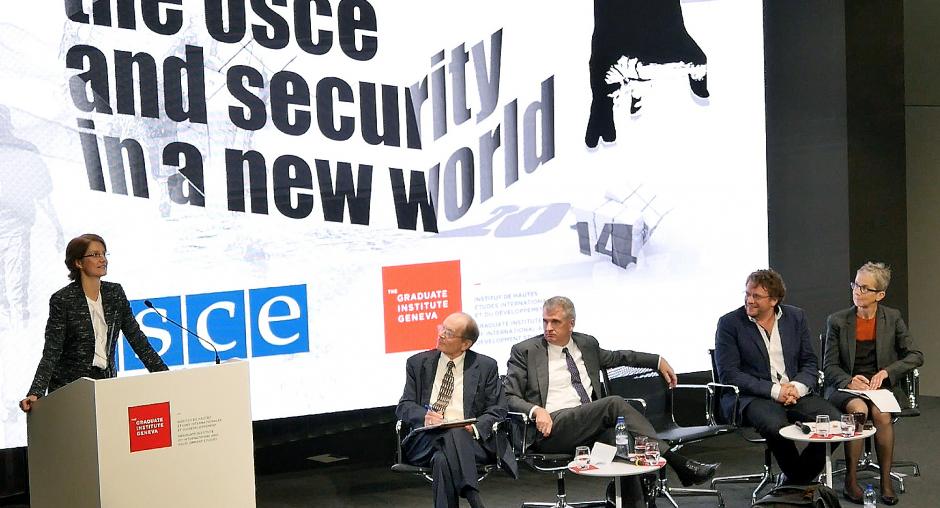The OSCE and Security in a New World

The crisis in Ukraine, which began with protests on the Maidan square in Kyiv late last year, has seen the Russian annexation of Crimea and persists with fighting in eastern Ukraine, has revived former Cold War tensions. But some think it also marks the beginning of a new epoch in Europe, in which the notions of war and of human rights may need to be fundamentally rethought.
The situation in Ukraine and the role played by the Organization for Security and Co-operation in Europe (OSCE), which is leading the international response to the crisis, was discussed at a recent roundtable at the Graduate Institute in Geneva. The debate centred on the question of what the crisis tells us about today’s security issues.
The panel was chaired by Thomas J. Biersteker, Gasteyger Professor of International Security and Conflict Studies at the Graduate Institute, with the participation of Timothy Snyder, White Bird Housum Professor of History at Yale University, Peter Pomerantsev, TV producer and Russia expert, and Rasa Ostrauskaite, Deputy Director of the OSCE Conflict Prevention Centre.
The panellists spoke of a new mode of warfare that is unfolding, in which goals and actors are undeclared and shifting and public confusion seems to be as much a weapon as armed combat. Pomerantsev pointed to the fact that the media is being used not to persuade, but to manipulate. The abuse of freedom of information to spread disinformation, the use of freedom of speech to destroy the very possibility of freedom of speech, concerns not only Russia and Ukraine, but is a technology that will be taken up by malign states and groups in the 21st century, he feared.
State sovereignty and human rights, two principles of the Helsinki Final Act, the OSCE’s founding document, have been fundamentally mutated in the course of the crisis, Snyder contended. He contrasted the traditional attitude towards human rights held by the protesters on the Maidan, where the death of one person – a non-Ukrainian in fact – was seen as an enormous violation and provoked the transformation of the movement into a revolution, with the insidious instrumentalization of human life later witnessed in the conflict in eastern Ukraine. “If I can get you to kill in the name of a lie – in this case the lie that the fascists are coming – then that makes the lie true, because it is impossible for you to confront the possibility that you have killed somebody for no reason,” he said.
Snyder argued for an expansion of the catalogue of fundamental rights, to include, for instance, the individual right to not being deliberately surrounded by hate speech that incites you to beat and kill, or the collective right not to have one’s identity ethnicized from a distance by a foreign state.
The panel also informed on the OSCE’s response to the Ukrainian crisis. Debates within the security organization, which counts both Ukraine and Russia among its 57 participating States, have been frequent, intense, often acrimonious and, understandably for an organization that requires consensus for its decisions, usually inconclusive. Notwithstanding, emphasis was placed on the importance of keeping channels of communications open, since without high-level contacts invisible to the public eye, the visible elements of the OSCE’s response would never happen.
The OSCE, chaired in 2014 by Switzerland, has been at the centre of political negotiations to resolve the crisis and negotiate a ceasefire. It has sent a special monitoring mission to Ukraine, the largest OSCE operation since the 1990s, currently comprising 250 monitors in ten locations, which provides daily reports to participating States and to the public. After intense negotiations in July, a border observation mission was established at two border crossing points between Ukraine and Russia currently manned only by the Russian side. The mechanism on unusual military activities under the Vienna Document (containing military confidence and security building measures) has been triggered 13 times during the past year, and 15 military inspections have been conducted on the ground. The OSCE monitors elections in the country, reports on human rights, the situation of national minorities and media freedom, supports disarmament and demining efforts and, perhaps most importantly, works with its permanent field operation based in Kyiv to promote a long-term process of national dialogue.
Still, there are obvious shortcomings: the OSCE has no presence in Crimea, is currently monitoring only 2 km of the nearly 2,000 km long border between Russia and Ukraine and its 80 unarmed, civilian monitors stationed in the Donbas (eastern Ukraine) are being asked to do ceasefire monitoring, which is essentially a military task.
Horrifying as it is, Ukraine may just be a side show in a policy ultimately designed to move back to the era of nation states, to fragment and destroy a unified Europe, Snyder warned. The OSCE faces a philosophical choice, of accompanying the crisis and making things look better than they are, or of confronting the fundamental challenges it poses, he concluded.
The roundtable, organized by the OSCECommunications and Media Relations Section, in co-operation with the Graduate Institute, was held at the Maison de la Paix in Geneva on 1 October.
